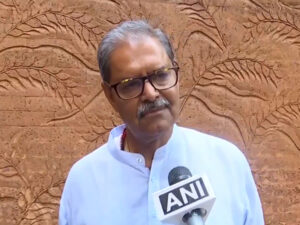ED interrogates Kerala CM’s additional private secretary for 9 hours
Kochi (Kerala) [India], March 7 (ANI): The Enforcement Directorate (ED) on Tuesday interrogated Kerala Chief Minister Pinarayi Vijayan’s additional private secretary CM Raveendran for nine hours in connection with the LIFE Mission scam case.
The interrogation started at 10.30 am and ended at 7.30 am.
On February 27, Raveendran did not appear before the ED for questioning in connection with the LIFE Mission Scam case.
ED on Thursday (February 23) issued notice to Raveendran in the LIFE Mission scam case. He had informed the central agency that he cannot appear on February 27 as the legislative assembly session was underway at Thiruvananthapuram.
A Prevention of Money Laundering Act (PMLA) Court had sent M Sivasankar, former Principal Secretary to the Kerala CM Pinarayi Vijayan to judicial custody till March 8 in the LIFE Mission Scam case.
On February 16, the remand report submitted by ED in the PMLA Court against M Sivasankar, former principal secretary to the Kerala CMO in the LIFE Mission Scam Case, revealed some WhatsApp chats between him and other accused Swapna Suresh.
The remand report alleged that there is a larger nexus involving government representatives in the allocation of contracts and the generation of proceeds of crime via the upfront commission as a bribe.
“In his WhatsApp message sent to Swapna on July 31, 2019, Sivasankar warned Swapna to be very careful and asked to take care. In his WhatsApp message, Sivasankar told Swapna not to get involved and warned her that if something goes wrong, they would put blame on her. He also told Swapna to keep away from the process to which Swapna replied that she would give it to Sarith and Khalid (other suspects in the case). Sivasankar also told Swapna that CM had asked him to get a job for Swapna,” the remand report read.
The report further said that the material evidence such as the WhatsApp conversation between Swapna Suresh and Sivasankar and the statement given by Suresh, it is clearly indicating that there is a larger nexus involving government representatives in the allocation of contracts and generation of proceeds of crime via the upfront commission as a bribe.






